Disclosure: Meeple Mountain received a free copy of this product in exchange for an honest, unbiased review. This review is not intended to be an endorsement.
Maybe it says something about my personality, the speed with which I leapt at the chance to review Deadly Dowagers. Two to six players compete as Victorian dowagers to accumulate a dowry sufficient to attract a Duke by investing in properties and “strategic serial marriages.” It is a satirical card game of murder and manipulation. Sounds like a ripping good time, doesn’t it?
Designed by Sarah Shipp with art by Mercedes Palacios, Sparkworks (Panorama and the Princess Bride series of games) has a fitting release for International Womens’ Day.
“Darling, could you fetch the cake knife?”
Deadly Dowagers plays over an unspecified number of rounds until someone marries the Duke and rides off into the suspiciously blood-stained sunset. Each round consists of four phases: The first is a Draft in which players select one card from a dwindling hand and pass the rest, collecting four altogether. The second involves playing cards into a tableau as Investments. The third is the Husband phase where you might marry or, if already married, arrange for the untimely death of said husband, or perhaps marry and kill on the same turn. Or neither. (You know how fickle these affairs can be.) The final “phase” is hardly a phase at all beyond reminding everyone that no more than three cards may remain in hand moving into the next round where five cards are drawn and the process repeats.
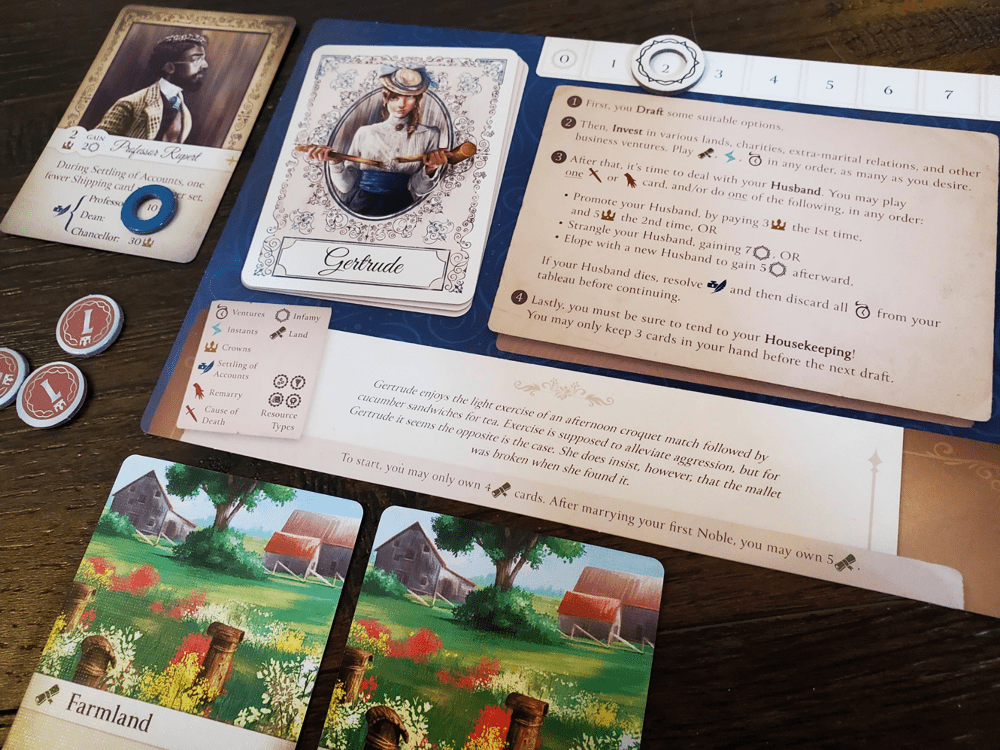
Along the way, players earn Crowns (coins) as they amass inherited wealth from the recurring sound of croaking spouses. However, each dowager must then track Infamy as they spread rumors, have affairs, and dispatch husbands of varied social status.
If a player enters the Husband phase widowed with a Remarry card in hand plus 120 Crowns and an Infamy rating below 9, they are eligible for victory. When multiple dowagers are eligible for victory, ties are settled by the shallow means of excess money and the least damaged reputation. Apparently the Duke is only marginally more honorable than his “ladylike” suitors.
Players gain wealth by creating a tableau of property nvestment cards: Farms, Mills, and Estates. Within the life of each husband, Farms can pair with Rent for added cash upon death. Likewise, Mills match with Mechanical Upgrades that grant extra coins based on the specialties of the Farms and Tenants. Shipping cards represent overseas interests and pay off when the set is large enough. Estates serve only to reduce Infamy through coin payments. While the land itself survives death, none of the accoutrements do.
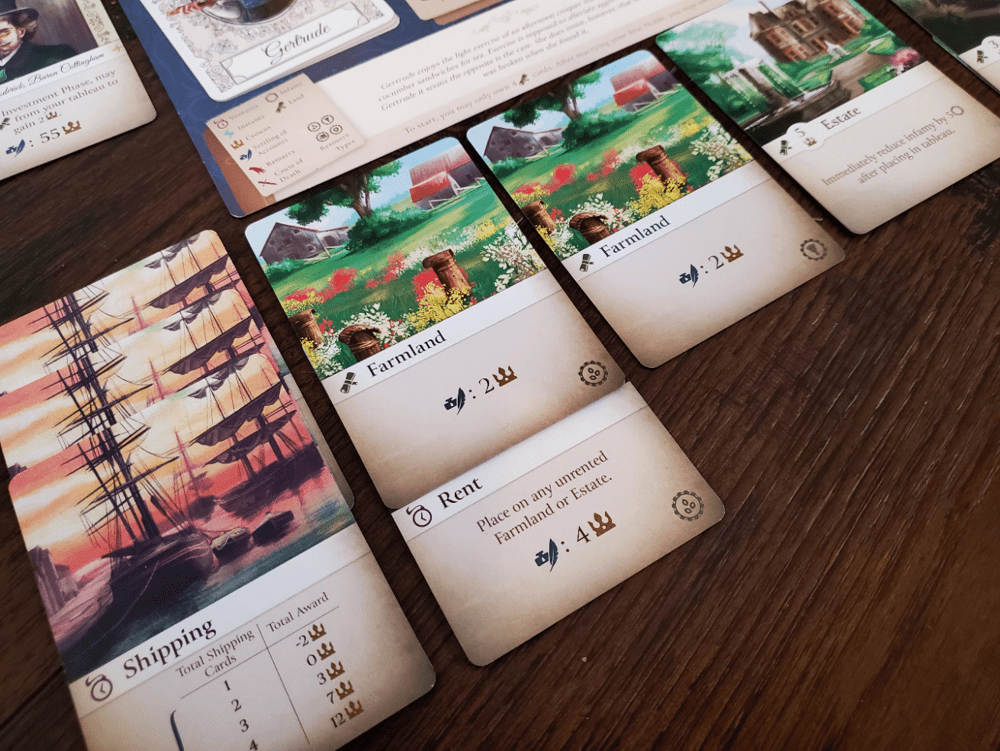
Each round’s Draft includes investment cards along with the deviant activity cards mentioned above. Various murder weapons and Remarry cards fuel the addictive marital revolving door. Charity cards provide one additional chance to share Crowns in exchange for a reduced Infamy rating.
The Investment phase is a simultaneous free-for-all of laying cards, collecting and dispensing Crowns, discarding, and exercising the special abilities of the various husbands.
The Husband phase allows for the play of a single card—for murder or marriage—and/or one of three available actions taken in any order. When a murder card is unavailable, players may Strangle their husband without a card for a brutal penalty of 7 Infamy—even murder has its limits. When a Remarry card is unavailable, players may Elope with a new husband at a cost of 5 Infamy. The benefit of Elopement is the possibility of offing husbands in consecutive rounds should there be a tactical advantage in doing so. Players must be careful, though, because each dead husband adds a penalty of one Infamy to each successive death.
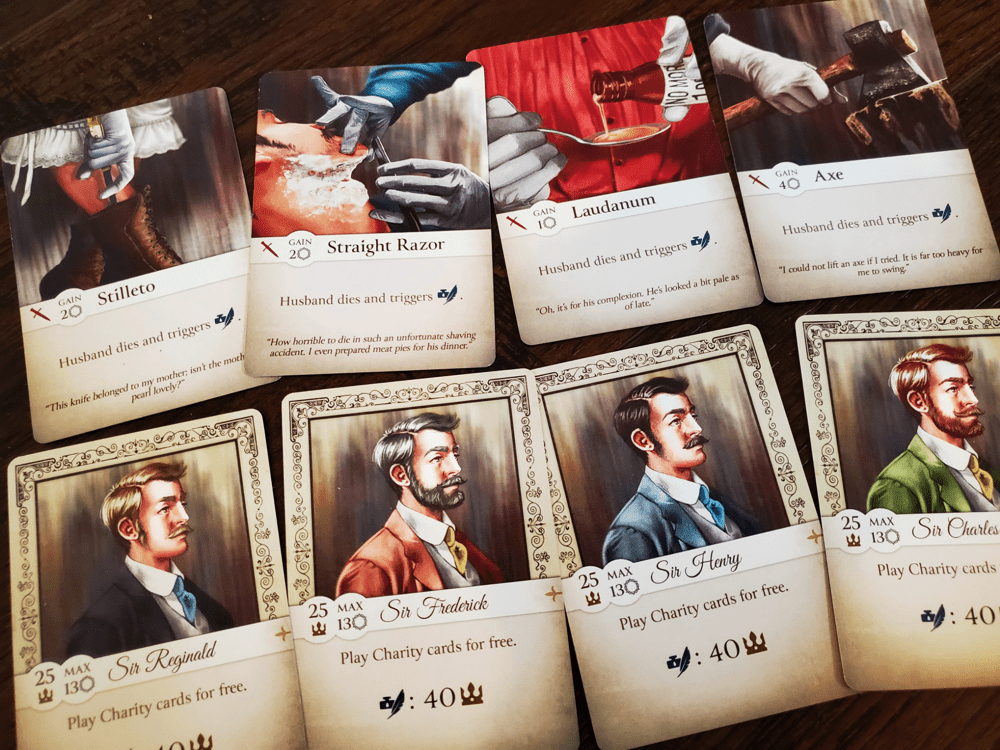
One last action available during the Husband phase is promotion. There are two husbands—the academic and the man of God—that are eligible for promotion. For a minimal cost in Crowns, these husbands advance in their respective vocations becoming more valuable in death.
There are 24 husband cards consisting of seven types. Three are of a common background and four of a noble class. The dowry they require in marriage (payable in Crowns) increases along the way, as does the subsequent inheritance. Each husband also has a different view towards or effect upon Infamy. The idea is to deftly climb the social and financial ladder while managing Infamy in preparation for the Duke.
While there is no set game length, two to four dead husbands per player ought to have someone ready to bring the affair (pun dreadfully intended) to a conclusion.
“Don’t tease me so.”
I am torn on this one, I really am.
One of the greatest strengths of Deadly Dowagers is simultaneous play. Drafting is a lovely mechanic because everyone is always playing and every decision affects the next player. A draft of only four cards, though, struggles to gain traction.
The investment phase mostly works because there is little opportunity to cheat or make mistakes when each card has a clear and simple use. But there is this little rule that bothers me, one that allows for the discard of any Land card during the phase. Just like that. Need room for an Estate? Just throw away an old one! Then do it again instantly if you have too much Infamy. The trouble is, there is also a rule that limits the number of Land cards a player may own. But if you can toss them off immediately without consequence (and often with great benefit!), what’s the point of the limit? Just save a space for revolving Estate cards and you’ll never have to worry about your Infamy rating.
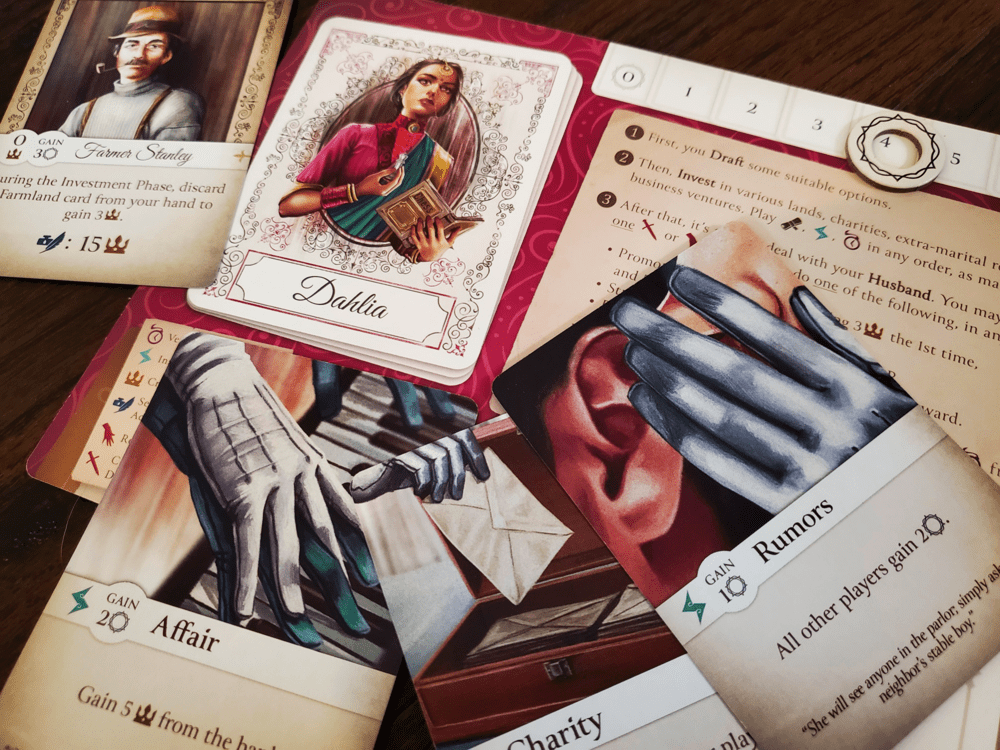
With this rapid-fire play, there is a fair amount of reshuffling the deck throughout the game as the player counts rise. I understand the economy of it, but with 4-6 players (which is, by far, the most entertaining way to play!), it’s a regular occurrence as upwards of 30 cards might come out of the deck (of 89) each round.
The husband phase contains one eye-opening potential hiccup. With a limit on the number and variety of husbands in the game, there may come a moment where multiple dowagers want to marry the same man—perhaps the final of his kind in the stack. At this point, the first dowager to get her hands on the man gets the man almost like a slap-happy game of Egyptian Ratscrew. Maybe it’s thematic in a fistfight-for-a-rich-husband sort of way. I would have preferred a specific sort of Intrigue card or symbol scattered about the cards that might have created an ongoing tie-breaker instead?
Now managing that same stack of husbands to climb the ladder and get you a Duke? This is perhaps my favorite aspect of the game. Each husband has a special ability and pays out differently, so it is entirely possible to work the system as you pay attention to the cards that have passed by already. Haven’t seen a lot of Affair cards lately? Grab the Viscount who allows for penalty-free infidelity. Need to reduce the Infamy level in a hurry? The Earl doubles all such efforts. Looking to spend a few rounds with the same beau and maybe score on shipping? Marry down the ladder with a Professor then pounce at the Duke. I really enjoy figuring out who is best for the moment (and keeping a free hand ready in the off chance I have to slap for him).
Deadly Dowagers is remarkably well-balanced. Aside from the occasional two-player game, I have rarely seen a game that didn’t feature at least two dowagers ready for the Duke on the same turn. The tight squeezing adds a need for efficiency. There is timing in reducing Infamy enough to strangle a final husband and still be able to marry the Duke for victory. A few extra Crowns might seal the deal. I’ve seen a game go to the second tie-breaker and award the player with less Infamy. There’s a bit of excitement as players shuffle through their excess coins to tally the final result.
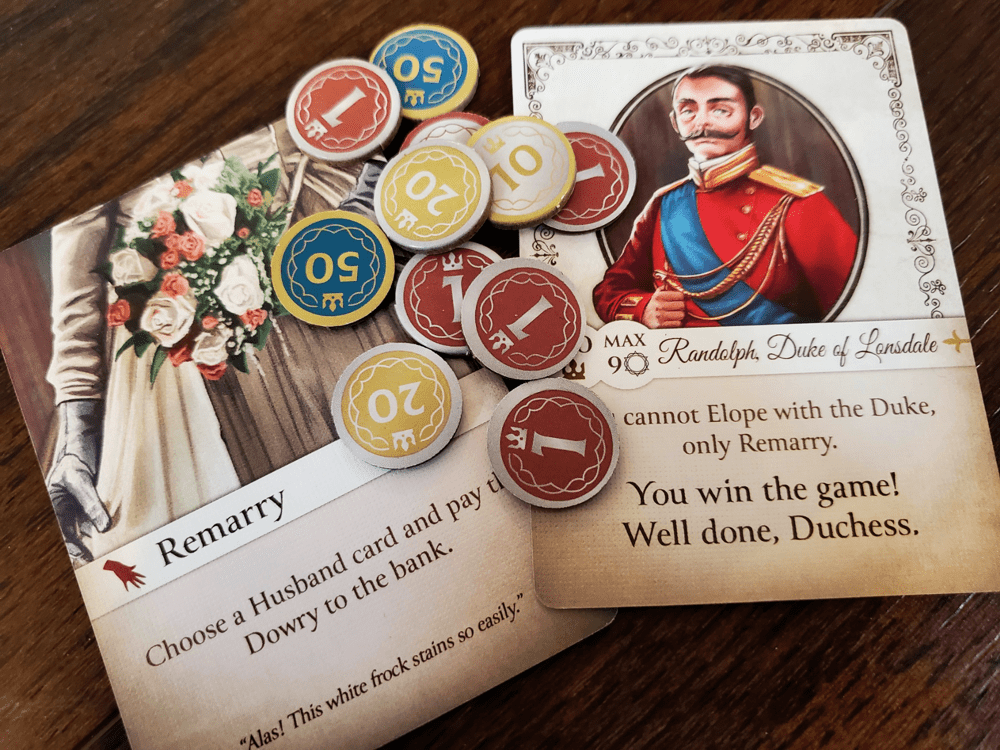
“I could not lift an axe if I tried.”
Here is the fence, though, and I leave it to you to decide on which side you might fall. Deadly Dowagers can be played in 20 minutes. The box says 30 minutes, but with all the simultaneous play, it’s entirely dependent on the players at the table. If those players are familiar and attuned to the possibilities, the game flies…and dies.
There’s something about this game that begs to slow down. Maybe it’s the Victorian theme. Maybe it’s the flavor text on the cards. Maybe it’s the fact that it’s a game of strangely satisfying relationship-building, investing, and murder. These are things that feel like they should take a bit of time. Each round’s Draft of only four cards is over in a flash. The Investment is over in a flash, the occasional murder takes time for the settling of accounts, but only moments more: a quick count, a coin grab, and a discard. The fourth phase doesn’t really exist. The faster it all goes, the less it feels like anything happened at all. And there’s too much shuffling around for nothing to happen at all.
Some card games fly once they’re familiar and it just feels right. This one loses too much of its charm. My favorite games have been players’ first games because they tend to be a bit slower. The theme has room to breathe, someone takes the time to say, with some excitement, “I’m marrying Sir Henry!” and the actions have just enough time to gather a bit of consequence. It borders on being one of those games in the long run that requires a group of people who really celebrate the thematic quirks to sustain an enjoyable pace. And how odd that the labor is in slowing down? With four, five, or six players at a casual pace, this is a worthy title.
Bottom line: there is a lot to love here, especially if the theme excites you. Just take your time, press into the twisted story of it all, and get you a Duke.


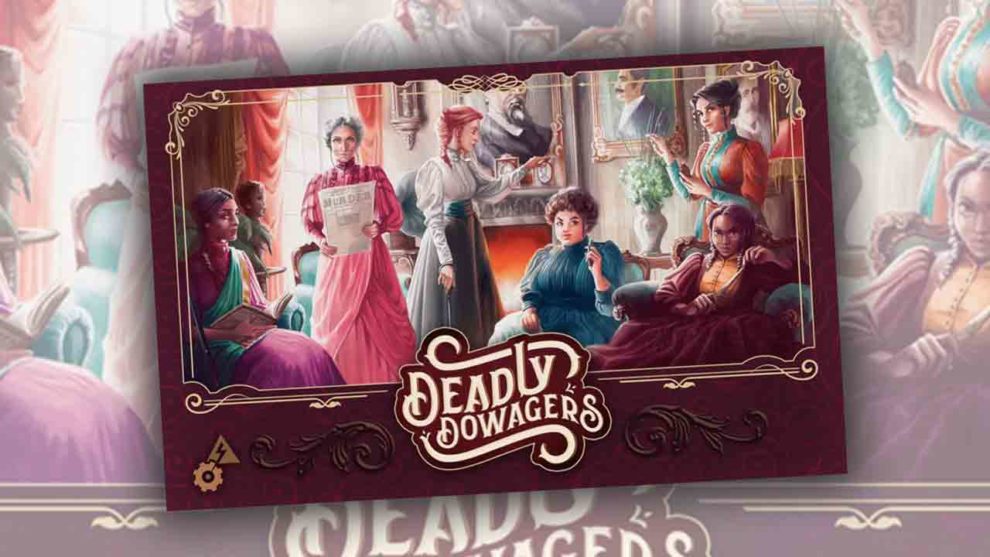









Add Comment